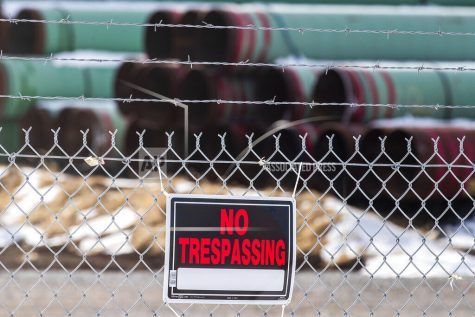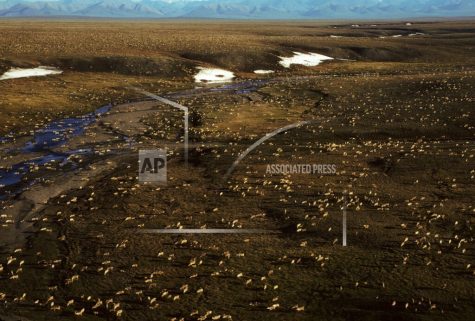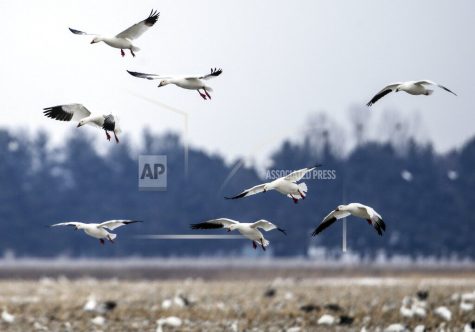Longtime safeguards for U.S. bird populations took a hit under former President Donald Trump, whose administration made it harder to prosecute industry-caused deaths — such as the 2019 destruction of a sprawling Virginia seabird nesting ground — and chipped away protections for endangered species.
President Joe Biden wasted little time seeking to turn things around. Hours after taking office, he ordered a review of his predecessor’s decision to weaken enforcement of the century-old Migratory Bird Treaty Act. It was among more than 100 business-friendly Trump actions on the environment that Biden wants reconsidered and possibly revised or scrapped.

A White House statement Wednesday described them as “harmful rollbacks of standards that protect our air, water, and communities.” And the president targeted oil and gas leasing on federal land and subsidies for those industries in his bid to slow climate change, while promising stepped-up land and water conservation.
Despite the quick start, it will take months or years to reverse policies set in motion by Trump’s team — including those involving the bird treaty rollback, which happened as North American populations continued a decline that has reached 3 billion — a one-third overall drop — since 1970.
Many rules Trump went after originated with former President Barack Obama and took him years to undo, continuing a decades-old, back-and-forth between Democratic and Republican administrations with starkly differing approaches to environmental regulation.
“You have the worst-case scenario of partisan ping pong,” said Clint Woods, a former Environmental Protection Agency deputy assistant administrator under Trump.
Environmental activists are pressing for fast action. They say returning to the pre-Trump status quo is no longer enough as hundreds of millions of birds die annually at the hands of industry, global temperatures rise and poor communities remain vulnerable to air and water pollution.
Biden faces similar challenges as he inherits Trump’s actions across the environmental spectrum — from removal of endangered species protections for gray wolves, to loosened energy standards for washers and dryers and reversal of the Obama administration’s proposed ban on chlorpyrifos, a crop pesticide some scientists say could harm children.
Business groups lobbied for Trump’s deregulatory approach. Critics said it crippled bedrock environmental protection laws, slashed agency funding and slackened enforcement.
“There’s a huge amount of work to be done,” said Erik Olson, a senior strategic director with the Natural Resources Defense Council. “The Trump administration not only did their best to roll back rules, but tried to eviscerate the basic infrastructure of the agencies. They brought in people who viewed it as their job to keep agencies from carrying out their missions.”
Mandy Gunasekara, EPA chief of staff for part of Trump’s term, said Biden’s early acts signaled a turnaround from the Republican administration’s efforts to balance economic growth with environmental protection. Those include canceling a permit for the Keystone XL oil pipeline and halting energy leasing in the Arctic National Wildlife Refuge.

“In the real world where people are breathing air and drinking the water and living on once-contaminated land, we made considerable progress,” Gunasekara said. “Instead of trying to wipe the slate clean, they should build off the good work we’ve done.”
One cause for optimism, environmental advocates said, is that most of Biden’s initial appointees to key posts are former insiders. Gina McCarthy, the national climate adviser, served as Obama’s EPA chief. Michael Regan, tapped to lead EPA, was an air quality specialist there.
“This is a team of experts as opposed to a team of novices,” said Ann Mesnikoff, federal legislative director for the Chicago-based Environmental Law and Policy Center.
Some Trump actions were taken through decrees and documents that can be rescinded or revised. Biden staffers will comb through a flurry of measures from Trump’s last days that haven’t taken effect and could be pulled back, such as the bird death rule.
But some policies can be undone only through multi-year grinds involving scientific research, public comment periods and lobbying from advocacy groups.
Among them: last year’s weakening of the National Environmental Policy Act, a Nixon-era law requiring federal agencies to consider how projects such as oil pipelines could harm natural surroundings. Trump’s revision shortened reviews and exempted some projects.
Restoring the law’s reach is “an essential tool for achieving climate goals and equity for vulnerable communities” — both Biden priorities, said Oday Salim, an assistant professor of environmental law at the University of Michigan.
Other Trump rollbacks include a reduction of water bodies protected from pollution under the Clean Water Act and changes in how the EPA evaluates science and calculates benefits from pollution reductions. Biden called for action on those two EPA rules as soon as possible.

Courts already intervened to halt some Trump rules and policies, including attempts to open vast western lands to energy development, grazing and mining. An appeals court last week tossed a redo of an Obama-era plan to regulate greenhouse gas emissions from power plants.
The Trump administration lost or withdrew proposed rule changes in almost 80% of 109 court challenges tracked by the Institute for Policy Integrity at New York University law school. Past administrations have lost or backed down in 30% of cases, said adjunct professor Bethany Davis Noll, who helped compile the data.
Yet the federal judiciary became more conservative under Trump, who appointed nearly 30% of active judges, according to the Pew Research Center. Six of the Supreme Court’s justices are Republican appointees.
Environmental advocates acknowledge the hurdles but want an aggressive response to Trump’s actions, particularly those undermining policies that had survived under both parties.
The law protecting migratory birds is one.
Under Trump, the government stopped pursuing punishments for accidental but preventable bird deaths, such as when they collide with power lines or drown in oil waste pits. Enforcement cases against companies dropped from almost 60 cases annually on average to zero.
Virginia’s Democratic governor blamed the change for the 2019 destruction of a nesting ground for 25,000 shorebirds to make way for a road and tunnel, after federal officials said conservation measures were no longer required.
A judge later rejected the Interior Department’s justification for the bird policy change. So the department adopted a regulation doing the same thing.
Although Biden’s administration could withdraw it, bird advocates want even stronger protection than before, which would require a time-consuming new rule.
“We have to think smarter, we have to think broader than the Obama administration to accomplish conservation and environmental protection,” said Sarah Greenberger, former senior advisor in Obama’s Interior Department and now an Audubon Society vice president.
———
Flesher reported from Traverse City, Michigan, and Brown from Billings, Montana. Contributing to this story were AP writers Christina Larson in Washington, D.C., Tammy Webber in Fenton, Michigan, and Janet McConnaughey in New Orleans.
____
On Twitter follow John Flesher: @JohnFlesher and Matthew Brown: @MatthewBrownAP















